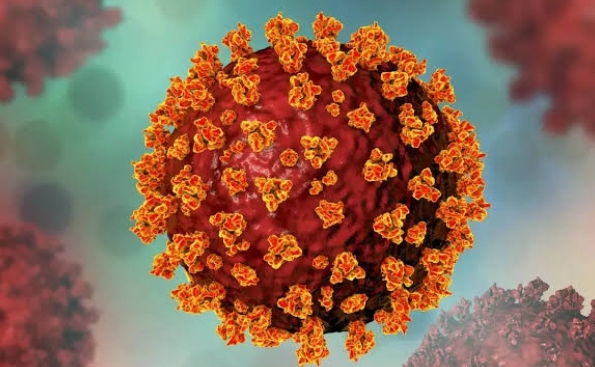Monday June 2, 2025|
A new COVID-19 variant, NB.1.8.1, is drawing growing concern among global health experts.
First linked to a spike in hospital admissions in China, the subvariant has now surfaced in the United States, detected in international travellers arriving in cities like New York and Washington, D.C. According to the U.S. Centers for Disease Control and Prevention (CDC), it was identified through airport surveillance testing conducted between late March and early April 2025, CBS News reports.
“CDC is aware of reported cases of COVID-19 NB.1.8.1 in China and is in regular contact with international partners,” a CDC spokesperson stated.
Although the number of cases remains relatively low, scientists are keeping a close eye on NB.1.8.1 due to signs that it spreads faster than recent variants.
Belonging to the Omicron JN.1 lineage, NB.1.8.1 has been designated by the World Health Organization (WHO) as a “variant under monitoring.” This designation is due to its increasing prevalence in multiple countries and the possibility that it can partially evade immunity from prior infections or vaccination.
WHO’s latest data reveals that NB.1.8.1 accounted for 10.7% of global COVID-19 sequences between April 21 and 27, up sharply from 2.5% just a month earlier.
So far, there is no strong evidence that the variant causes more severe illness. However, the symptoms remain consistent with previous Omicron variants: sore throat, fever, fatigue, muscle aches, nasal congestion, and, in some cases, gastrointestinal issues.
Dr. Amy Edwards, a pediatric infectious disease expert at Case Western Reserve University, told CBS that early lab findings suggest NB.1.8.1 binds more efficiently to human cells, increasing its ability to spread.
“It’s not necessarily more dangerous in terms of severity,” she said, “but we are seeing increased hospitalisations in areas like China and Hong Kong where this strain is surging.”
The subvariant is no longer limited to Asia and North America. Cases have been confirmed in Japan, South Korea, Vietnam, Thailand, Taiwan, France, Spain, and the Netherlands. In Australia, NB.1.8.1 now makes up more than 40% of all COVID-19 cases in Victoria and is the dominant strain identified in wastewater samples from Perth.
In response, South Korea has stepped up surveillance of COVID-19 trends in China and Hong Kong, even as WHO maintains that the variant currently poses no greater threat than its predecessors.
Since the initial outbreak in late 2019, SARS-CoV-2 has evolved through multiple waves—Alpha, Delta, and Omicron—each shaping global public health responses. NB.1.8.1 continues the Omicron trend of high transmissibility, though not necessarily greater severity.
In Nigeria, however, health officials have remained silent. As of this report, the Nigeria Centre for Disease Control and Prevention (NCDC) has not issued any public statement or advisory on the emerging variant. There are no new travel, testing, or surveillance guidelines in place.
The NCDC’s updates on COVID-19 have become increasingly infrequent since the sharp global drop in cases and fatalities. Whether this new variant will reignite local or international alerts remains to be seen.
Related posts
Categories
- Advertisements (1)
- Agriculture (45)
- Breaking News (26)
- Business (598)
- Crime (991)
- Education (320)
- Entertainment (128)
- Features (13)
- For The Records (43)
- Foreign News (1,190)
- Health (219)
- Home News (332)
- Interview (9)
- Judiciary (351)
- Lifestyle (140)
- Local News (111)
- National News (1,448)
- Opinion (26)
- Politics (1,014)
- Religion (157)
- Science and Technology (125)
- Security (683)
- Sports (881)
- States' News (822)
- Transportation (330)
- Uncategorized (10)

